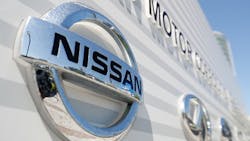Nissan Plans to More Than Double Mideast, Central Asia Factories
Nissan Motor Co. plans to more than double the number of factories it has in the Middle East and central Asia by 2022, as the Japanese automaker seeks to secure the top market share in some of the region’s most populous and wealthiest nations.
The company currently has three factories in India, Egypt and South Africa. It wants to add facilities in countries including Pakistan and Algeria, Peyman Kargar, chairman of Nissan in Africa, the Middle East and India, said in an interview. Others would come later, he said.
“We want to more than double our industrial footprint in the Middle East, Africa and India by 2022,” said Peyman.
As Nissan is planning to boost production in the region, it’s paring back in the U.K. The next version of its X-Trail sport utility vehicle will be made in Japan instead of Sunderland, England, and it’ll halt production of the Infiniti Q30 sedan and QX30 crossover at that plant as it withdraws the premium brand from Western Europe.
While the region is one of the smallest markets for global car makers, Nissan produced 6% of its vehicles globally in India in 2016, according to the most-recent data compiled by Bloomberg.
The company is also aiming to leapfrog competitors in the Gulf Cooperation Council and Egypt by 2022 by increasing its market share to more than 20% by 2022, from 16% and 15%, Peyman said. The GCC is home to six oil-rich countries including Saudi Arabia.
Egypt, with a population of around 100 million, is also considered a strategic market for Nissan, with plans to increase output from its factory there by 6,000 vehicles to 28,000 in the year that starts April 1.
But while Nissan’s outlook for Egypt is optimistic, Peyman said the government’s decision drop customs duties on cars imported from the European Union is a challenge in the short and medium term. The company has had “very positive” discussions with authorities government regarding this issue, he said.
“We asked them to support the local industry to be able to compete, to not put us in a less competitive situation.”
By Mirette Magdy
About the Author
Bloomberg
Licensed content from Bloomberg, copyright 2016.
